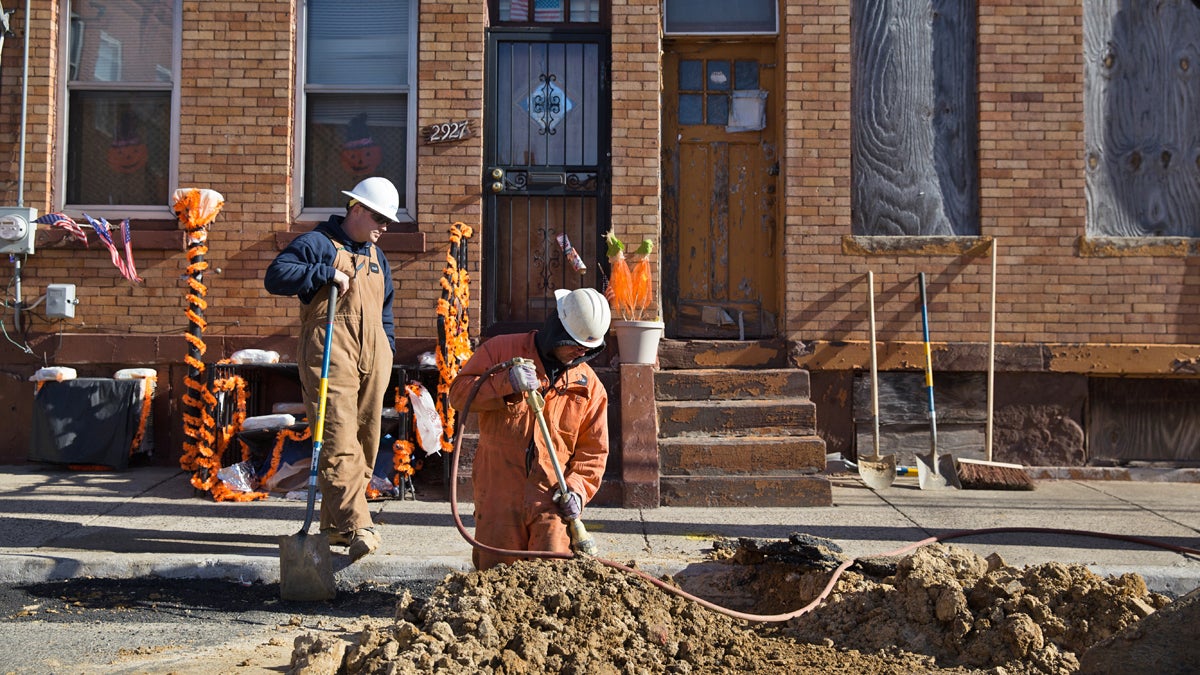PUC pushes Philadelphia to ramp up replacement of leaky gas pipes
Listen
Kevin McDonald, PGW Senior Pipe Mechanic uses a compressor to back fill soil covering new natural gas pipelines after an aging cast iron main was turned off in North Philadelphia. (Lindsay Lazarski/WHYY)
Officials at Philadelphia’s city-owned utility says it will take 88 years to replace old, leaky gas mains under a plan approved by the PUC.
Officials at Philadelphia’s city-owned utility says it will take 88 years to replace old, leaky gas mains under a plan approved by the Pennsylvania Public Utility Commission two years ago.
The commission announced Monday it has begun an in-depth safety review of that plan, putting pressure on the city to fix its pipes faster.
The review comes in the wake of a failed attempt to sell Philadelphia Gas Works to a private company – a move the PUC endorsed as a way to get the work done more quickly.
“We felt that after taking in all of that information, two areas of concern that came back [were] the high propensity of cast iron [and] bare steel,” PUC Chairman Rob Powelson said, “And how do we adequately replace that without causing shock to ratepayers?”
The state of PGW’s gas mains was a central theme at a hearing the PUC hosted in November before the nearly $2 billion deal with Connecticut-based UIL Holdings Corp. fell through. UIL claimed it would be able to ramp up pipe replacement, but the company was unable to make its case to the public because the Philadelphia City Council declined to schedule a hearing on the company’s offer.
Nearly two-thirds of PGW’s gas mains are made of cast iron and bare steel, materials that are prone to leaks. These leaks contribute to greenhouse gas emissions and can pose a significant safety hazard.
The PUC’s review will focus on analyzing PGW’s current plan and removing barriers to accelerate replacement of the metal pipes with tougher plastic ones.
Powelson said the commission, which has had regulatory oversight over the utility since 2000, will also consider whether to force the city of Philadelphia to give up its $18 million annual fee from PGW and put that money back into the main-replacement program.
“Having a system that is going to be replaced in 88 years, I think if you ask the average citizen, it’s not a question of if, it’s a question of when something’s going to happen,” Powelson said.
However, Philadelphia City Councilwoman Marian Tasco, who heads the Philadelphia Gas Commission, is crying foul on the PUC’s safety talk. She believes the commission is retaliating against the Council for not supporting the PGW sale.
“It’s like, ‘You didn’t do what we wanted you to do, so we’re going to extract pain from you,'” Tasco said.
In April 2013, the PUC approved PGW’s plan to add a “distribution system improvement charge” (DISC) to customer’s bills to fund infrastructure improvements.
“If the PUC was so concerned about the safety of the mains, they would have allowed more dollars for main replacement when they gave us the DISC program,” Tasco said.
Powelson, who disputes that the PUC’s actions are politically motivated, said the review will be completed by April 15.
WHYY is your source for fact-based, in-depth journalism and information. As a nonprofit organization, we rely on financial support from readers like you. Please give today.




